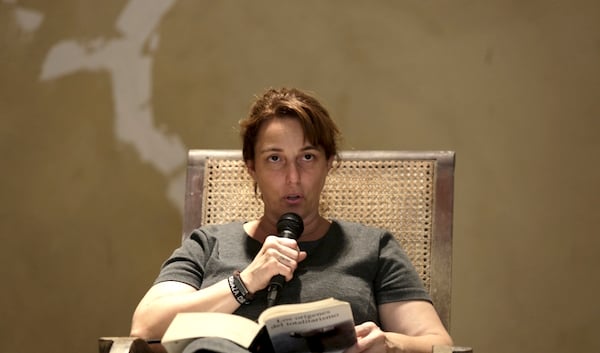
On Sunday May 24, the artist Tania Bruguera was detained in her Havana residence, where she had just finished a 100-hour public reading of Hannah Arendt’s The Origins of Totalitarianism (1951) (see Tania Bruguera Detained During Havana Biennial).
A video shot by the civil rights group Patriotic Union of Cuba has emerged, documenting the moment when Bruguera was arrested.
A group of agents is seen arriving at Bruguera’s house in Havana and leading her to a car, in which she’s taken away. One of the agents can be heard demanding that the cameraman stop filming (see Tania Bruguera Challenges Cuban Government With Reading on Totalitarianism During Havana Biennial).
Bruguera was released a few hours later. The following week she gave a short radio interview to PRI’s program The World, in which she declared: “”[The Cuban authorities] are so desperate and so afraid, they lost the symbolic implication of their action,” stressing how the irony of an arrest linked to a book about totalitarianism was clearly lost on them.
“I think they are extremely afraid of people taking to the streets. They are extremely afraid of people finally changing their double moral for honesty, and saying what they feel without fear of consequences,” Bruguera said. “I think that anyone trying something like that will be completely silenced as a lesson to the rest of the people. I feel right now that’s what they want with me, to give a lesson.”
Cuban-born Bruguera, who lives and works between Havana and Chicago, has been arrested four times since December 2014, after attempting to re-stage the open mic performance Tatlin’s Whisper #6 (2009) in Havana’s Revolution Square (see Tania Bruguera’s Arrest Slows the US–Cuba Thaw, How Tania Bruguera’s Whisper Became the Performance Heard Round the World, and Tania Bruguera Returns Award to Cuban Government).
Tania Bruguera and curator Pablo Leon de Barra (left) pose next to the roadworks outside Bruguera’s Havana house
Photo via: Pablo Leon de La Barra
Cuban authorities are holding on to Bruguera’s passport, which was confiscated during her first arrest (see Tania Bruguera Has to Stay in Cuba for Another 60 Days and Cuban Government Brands Tania Bruguera a Criminal).
“They tried twice to give it to me in exchange for not coming back ever to the country, which I didn’t accept,” she told PRI.
“The stakes are very high for artists in Cuba,” Bruguera asserted. “Right now, there’s a lot of potential foundations coming to Cuba. The ministry of culture is giving abandoned buildings to artists for free to set up their own institutions. There’s a lot of negotiations happening behind the curtains to keep artists quiet.”